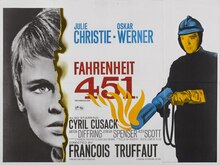
An ISU presentation about Fahrenheit 451 by Ray Bradbury. How to create a webinar that resonates with remote audiences. 1 Name Honors English 21 December 2018 Fahrenheit 451 Informative Research Writing Hitler’s use of indoctrination, censorship, and dehumanization show the dangerous impact of excessive control. In the article “Indoctrinating Youth,” the author demonstrates the use of indoctrination as a parlous method of obtaining control. Get help with your Fahrenheit 451 homework. Access the answers to hundreds of Fahrenheit 451 questions that are explained in a way that's easy for you to understand. This extract is from the opening of Fahrenheit 451 by Ray Bradbury. It was first published in 1954. 1 It was a pleasure to burn. It was a special pleasure to see things eaten, to see things blackened and changed. With the brass nozzle in his fists, with this great python spitting its.
By Bradbury, RayBook Id:WPLBN0100000519
Format Type:PDF (eBook)
File Size:1.71 MB.
Reproduction Date:1/1/1953
| Title: | Fahrenheit 451 | | Author: | Bradbury, Ray | | Volume: | | Language: | English | | Subject: | Fiction, Drama and Literature, Dystopia | | Collections: | Science Fiction, Authors Community, Most Popular Books in China, Favorites in India, Science | Historic
Publication Date: | 1953 | | Publisher: | Ballantine Books | | Member Page: | opensource opensource | Citation Bradbury, R. (1953). Fahrenheit 451. Retrieved from http://www.self.gutenberg.org/ |
Description
Fahrenheit 451 is a dystopian novel by American writer Ray Bradbury, published in 1953. It is regarded as one of his best works.[3] The novel presents a future American society where books are outlawed and 'firemen' burn any that are found.[4] The book's tagline explains the title: 'Fahrenheit 451 – the temperature at which book paper catches fire, and burns ...' The novel has been the subject of interpretations focusing on the historical role of book burning in suppressing dissenting ideas. In a 1956 radio interview,[5] Bradbury stated that he wrote Fahrenheit 451 because of his concerns at the time (during the McCarthy era) about the threat of book burning in the United States. In later years, he described the book as a commentary on how mass media reduces interest in reading literature.[6] In 1954, Fahrenheit 451 won the American Academy of Arts and Letters Award in Literature and the Commonwealth Club of California Gold Medal.[7][8][9] It has since won the Prometheus 'Hall of Fame' Award in 1984[10] and a 1954 'Retro' Hugo Award, one of only four Best Novel Retro Hugos ever given, in 2004.[11] Bradbury was honored with a Spoken Word Grammy nomination for his 1976 audiobook version.[12] Adaptations include François Truffaut's 1966 film adaptation of the novel and a 1982 BBC Radio dramatization. Bradbury published a stage play version in 1979[13] and helped develop a 1984 interactive fiction computer game titled Fahrenheit 451, and a collection of his short stories, A Pleasure to Burn.
Summary
Guy Montag is a 'fireman' employed to burn the possessions of those who read outlawed books. He is married and has no children. One fall night while returning from work, he meets his new neighbor, a teenage girl named Clarisse McClellan, whose free-thinking ideals and liberating spirit cause him to question his life and his own perceived happiness. Montag returns home to find that his wife Mildred has overdosed on sleeping pills, and he calls for medical attention. Two uncaring EMTs come over to pump Mildred's stomach, drain her poisoned blood, and fill her with new blood. After the EMTs leave to rescue another overdose victim, Montag watches over Mildred, watching the new blood fill her pallid cheeks. Montag then goes outside, overhearing Clarisse and her family talk about the way life is in this hedonistic, illiterate society. Montag's mind is bombarded with Clarisse's subversive thoughts and the memory of his wife's near-death. The next day, Montag finds Mildred in the kitchen, with no memory of what happened and talking incessantly about being hungry from an alleged hangover she has from a party she thought she attended last night. Over the next few days, Clarisse faithfully meets Montag as he walks home. She tells him about how her simple pleasures and interests make her an outcast among her peers and how she's forced to go to therapy for her behavior and thoughts. Montag looks forward to these meetings, and just as he begins to expect them, Clarisse goes absent. He senses something is wrong.
Excerpt
The novel is divided into three parts: 'The Hearth and the Salamander', 'The Sieve and the Sand', and 'Burning Bright'.
|
|
|
|


Fahrenheit 451 Figurative Language Answers

Figurative Language In Fahrenheit 451
FAHRENHEIT 451 by Ray Bradbury This one, with gratitude, is for DON CONGDON. FAHRENHEIT 451: The temperature at which book-paper catches fire and burns PART I IT WAS A PLEASURE TO BURN IT was a special pleasure to see things eaten, to see things blackened and changed.




